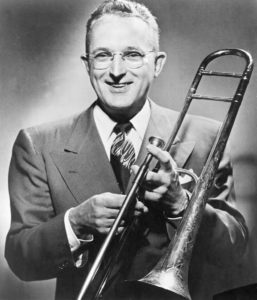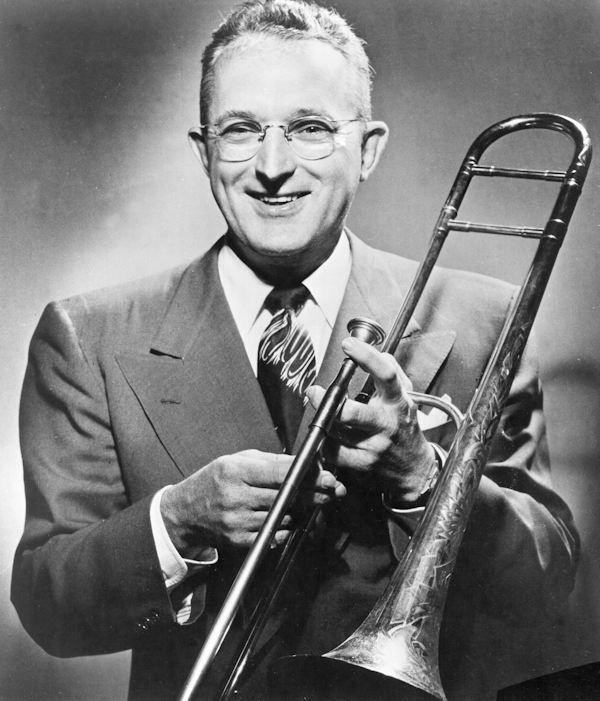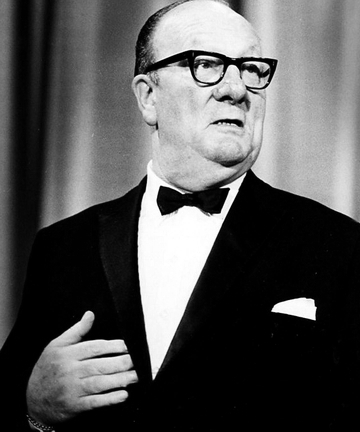
Tommy Dorsey, byname of Thomas Francis Dorsey, Jr., (born November 27, 1905, Mahanoy Plane, Pennsylvania, U.S.—died November 26, 1956, Greenwich, Connecticut), American musician who—both independently and with his brother Jimmy—led several of the most popular big bands of the swing era. He was also a highly respected and influential trombonist.
Both brothers received their first musical training from their father, a music teacher and marching band director. Tommy began his performance career on trumpet and trombone, eventually playing the trombone exclusively, though his trumpet playing was exceptional. As teenagers, they worked in several bands before forming their own combo, Dorsey’s Novelty Six, in 1920.
By 1922 the group, now known as Dorsey’s Wild Canaries, had attained some prominence in the Baltimore, Maryland, area and was among the first jazz bands to be broadcast on radio. During this period the brothers also played (sometimes separately but usually together) in a variety of musical groups. In 1927 they began recording with a changing slate of musicians they dubbed the Dorsey Brothers Orchestra. They had a string of hits in the late 1920s and early ’30s, often featuring vocalists such as Bing Crosby and his younger brother Bob.

Tommy Dorsey Orchestra - Weary Blues (1935-09-26)
After splitting with Jimmy in 1935, Tommy took over the remnants of the recently disbanded Joe Haymes Orchestra. Soon thereafter Tommy recorded “I’m Getting Sentimental over You,” which became his theme song and the source of his nickname, “The Sentimental Gentleman of Swing.”
Dorsey’s big band played music that ranged from smooth dance tunes to hot swing; Dorsey had a small group, the Clambake Seven, for more intense jazz. Noted sidemen who played for Dorsey included trumpeters Bunny Berigan and Ziggy Elman, saxophonists Bud Freeman and Johnny Mince, guitarist Al Viola, pianist Joe Bushkin, and drummer Buddy Rich. The band’s outstanding arrangers included Paul Weston, Bill Finegan, and Sy Oliver. Among their hit recordings were “Boogie Woogie,” “The Dipsy Doodle,” “Marie,” “Song of India,” “Opus One,” and “On the Sunny Side of the Street.” With its versatility and excellence, Tommy’s was one of the most consistently popular bands of the swing era.
Death
Sedated by sleeping pills following a heavy meal, Dorsey accidentally choked to death at the age of 51. His brother led his band briefly afterward, but Jimmy Dorsey died in 1957. Nevertheless, the Tommy Dorsey Orchestra continued to record and perform, and under the direction of Warren Covington it scored a final million-selling Top Ten hit in November 1958 with "Tea for Two Cha Cha."
Billed as "the sentimental gentleman of swing," Tommy Dorsey successfully combined the hot and sweet aspects of swing music while leading a band that consistently ranked among the top two or three orchestras in the U.S. from the mid-'30s to the mid-'40s, the entire swing era. His band was peopled with major jazz instrumentalists (including Bunny Berigan, Ziggy Elman, Pee Wee Erwin, Max Kaminsky, Buddy Rich, Charlie Shavers, and Dave Tough), arrangers (including Sy Oliver and Paul Weston), and singers (including Frank Sinatra and Jo Stafford) who went on to define popular music in the late '40s and early '50s. He was also an accomplished trombone player whose distinctive sound dominated his band and recordings. The bulk of those recordings were made for RCA Victor, though some later work was done for Decca and Columbia, and of course there are numerous airchecks, making for a large discography.



